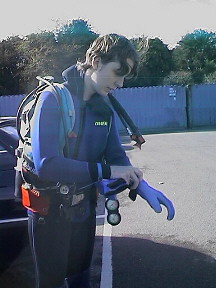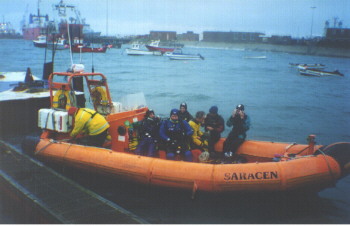
"Adrian! Help!"
"I've got weights in my pockets.
Weights on my ankles.
Weights round my waist.
Put that camera down and pass me up that cylinder.
If I bend over I may never get up again."

If your son wants to go diving but is a bit dubious do not feel you have to tag along.
That said, it is lots of fun, provided you do not mind getting cold and wet and that you do not have serious reservations about strapping about a hundred weight of steel and lead kit to yourself, including a knife that would make any policeman come over all official. Loaded to the point where you can only just shuffle about you then step straight off a dock into twenty feet of water knowing it is 6°C in there. This has strong overtones of 'Goodbye cruel world'.
However swimming in scuba gear must be experienced. Also, it is fun when buoyancy control by breathing becomes second nature so, if you are hanging in mid water and think 'I just want to go down a bit', you just start to descend. This is flying.
Don't ask about training exercises though...
If only it was like it was on the PADI training videos - warm water, coral
reefs, colourful fish, pretty little things in their skimpy swim-wear sweeping
photogenic drifting long hair out of the way as they do mask clearance
exercises. No tight hood in cold, old Stoney Cove.
Bunch of softies. We started in Scappa Flow. Portsmouth in November was
warm.

So what since then? Well I progressed through Open Water Diver
(abject novice) in October '98, on to Advanced Open Water Diver (novice
who knows how to fall off a boat) at the end of November, further to
Rescue Diver (possibly safe to let out on their own as one can pull the
other one out when they get it wrong) in November 1999 and Master Scuba
Diver (badge collectors badge) in August 2000. Since then I have moved into
more specialist diving including nitrox and trimix breathing gases and using a
Closed Circuit Rebreather.
We have dived the English Channel and the
Red Sea. We dived wrecks,
reefs and harbours. We have broken kit and survived. Got lost and survived. Got
swept away from our boat and survived. Not bad so far.
Diving means training. You can perhaps skimp a bit if all you do is dive in
warm water with a guide keeping count so he gets you all back to the boat or he
looses his bonus but in the cold, murky English Channel your training and kit
needs to be spot on.
We use Newhaven
Scuba Centre as a training school and for much of our gear and servicing.
We started somewhere else, we had some disappointments along the way, but we
are now well pleased.
We have dived with some good people in awful conditions and it was fun. We have seen things that we never expected to see in real life. We have clearly formed a wild addiction because we keep going back for more and more.
If you have the idea to try diving then just do it. Diving has long since passed from heroics to hobby and even if you're inland you can normally find a dive shop nearby that will do you a taster 'Try Dive' in a pool. A lot even do it free because they know a good number will want to do the course. If you don't try it you'll never know what you missed.
I wondered about writing a guide to how to go diving but it has already been
done too well. If you're in our bit of Sussex try
Newhaven Scuba
with my hearty recommendation. If you're elsewhere in the UK look up the
uk.rec.scuba
newsgroup's web site. Probably one of the more relevant resources about.
What I did write is a description of a wreck dive. It is
intended as an introduction to try and got some of the feel of diving as many
people have macarbe expectations of diving on a shipwreck.
Lastly "Is it safe?" The favourite question people ask.
Well Jacques Cousteau, the patron saint of diving, died on 25th June 1997 at
home in Paris at the age of 87 of a heart attack so he did better than the
average non-diver.
It is estimated that over two million Americans go scuba diving and that they
make over 18 million dives a year. There is an average of about 100 deaths per
year diving in the USA, giving a risk of about 1 death per 180,000 dives. This
looks even better when you consider that about 40% of these deaths were in fact
ordinary medical things that just occurred while diving. Scuba diving does
compound the problem of getting an ambulance and drowning can spoil your
enjoyment of a simple heart attack but scuba can not be blamed for the divers
coronary heart disease or failure of some other organ. UK figures are about 17
fatalities in 1999 of which at least three were other medical causes for about
80000 divers but I don't know the number of dives. It certainly beats
Motorcycle Racing.
 by Nigel Hewitt
by Nigel Hewitt